Oct 14, 2025. JTS Meeting, Meeting with Community Leaders
Hello. Today, Sunim will meet with visitors at The Peace Foundation and have a regular medical checkup at the hospital.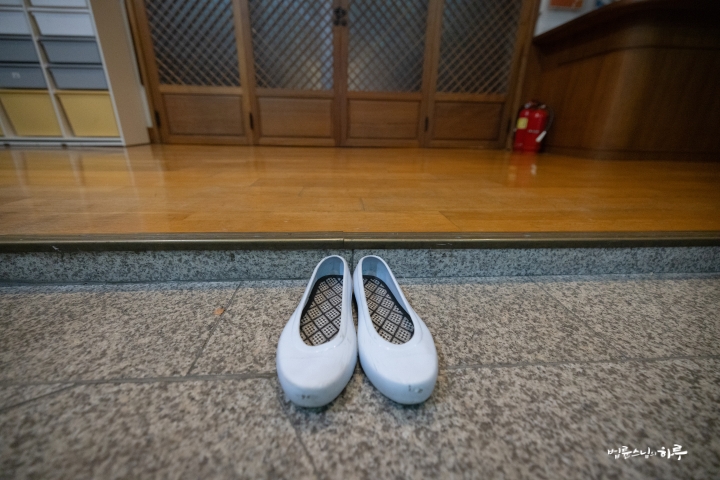
After completing morning practice and meditation, Sunim headed to the Jungto Social and Cultural Center. After working in the office, he held a meeting with JTS staff members starting at 9:30 AM.
First, he received a report from the Secretary-General on the preparations for the upcoming JTS 32nd anniversary seminar and reviewed areas that needed improvement. Then, based on the results of the field visit to Myanmar, Cambodia, and Thailand in mid-September, they discussed how to proceed with refugee support projects before concluding the meeting.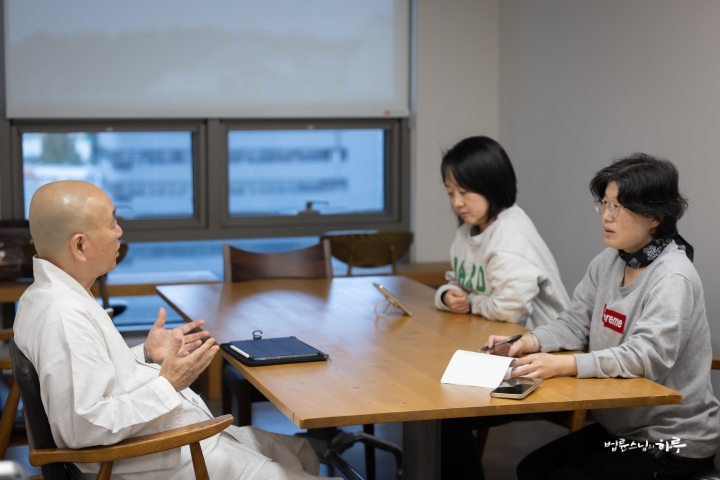
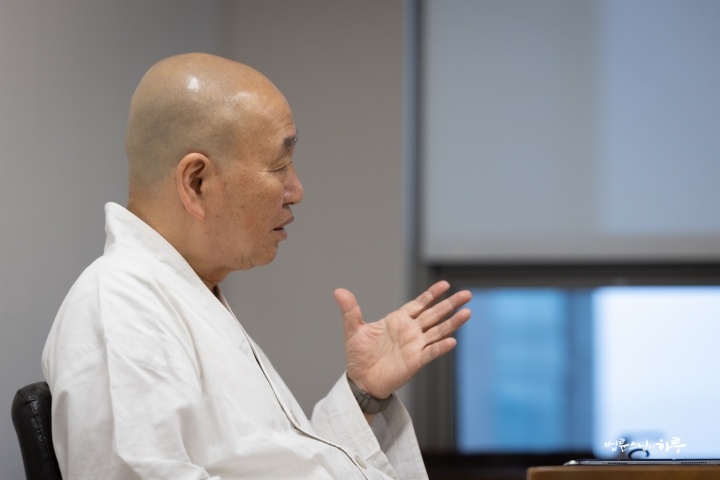
At 10 o’clock, Honorary Director Kang Dae-in from the Dialogue Culture Academy visited and held a meeting in the reception room. Director Kang requested that Sunim attend the 60th anniversary celebration of the Dialogue Culture Academy in December. Sunim readily agreed to attend and shared the results of his recent visit to the United States, engaging in extensive discussion with the director about what role social elders could play for peace on the Korean Peninsula.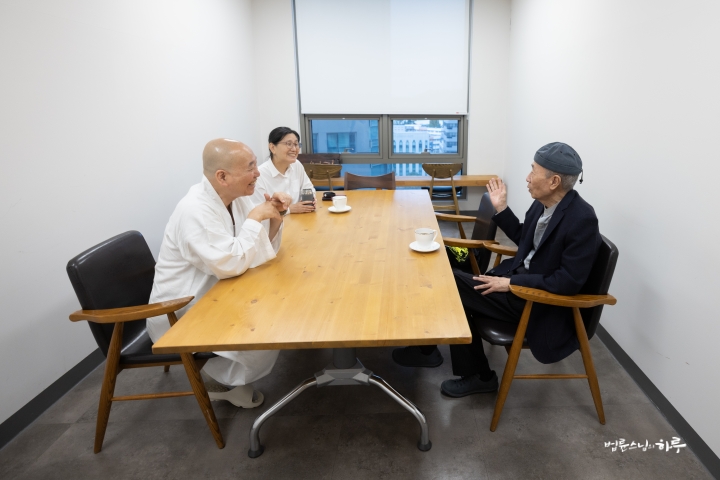
With a hospital examination scheduled for the afternoon, Sunim fasted and headed to the hospital at 1 PM. After arriving at the hospital and undergoing a chest CT scan, he returned to the Jungto Center.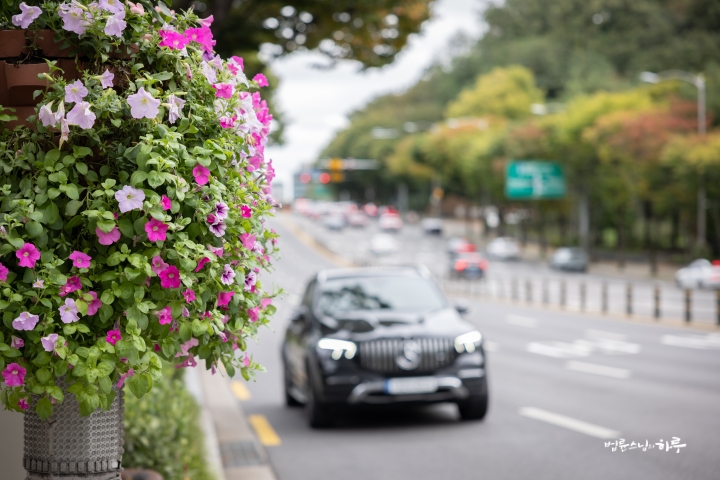
Tomorrow morning, Sunim will conduct a live broadcast of the Weekly Dharma Assembly from the Dharma Hall on the 3rd floor of the Jungto Social and Cultural Center. In the afternoon, he will have consecutive meetings with visitors at The Peace Foundation, and in the evening, he will travel to Dubuk Jungto Retreat Center.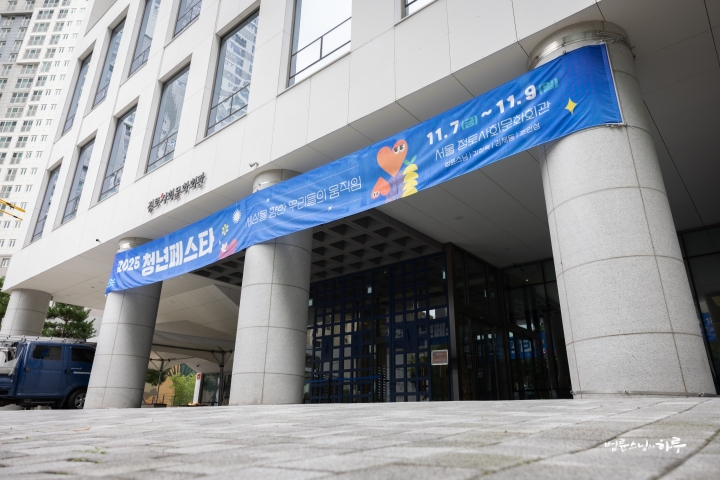
Since there was no Dharma talk today, I’ll conclude by sharing a conversation between Sunim and a questioner from the Happy Dialogue Dharma Q&A held in Bucheon City on the 10th.
I’m an Expectant Father Awaiting My First Child. What Kind of Mindset Do I Need to Be a Good Parent?
“Still, I would be grateful for any words you could share.”
“It seems you don’t understand what I’m saying. When I say I don’t know, I mean you should figure it out yourself. When rabbits, squirrels, or dogs give birth, do they worry about ‘How should I raise my babies?’ or do they just give birth?”
“They probably just give birth.”
“Do they raise them while worrying about how to do it, or do they just raise them?”
“They probably just raise them.”
“That’s right. When you have a baby, you naturally raise it. When a tiny baby cries, you’ll be confused at first and not know what to do, but you’ll try changing diapers and find ways by doing it yourself. After doing this two or three times, you’ll get the hang of it. Raising a baby isn’t something you learn in advance – you just do it. Looking at human history, no one has become a parent through ‘parent training.’ At first, you have one baby and raise it, then have a second, then a third, and before you know it, you become an expert.
Today’s parents worry not because they lack practice or training, but because they only have one child. If you have three or four children and raise them, you naturally become good at childcare. A bride and groom entering a wedding hall are awkward because it’s their first wedding. If they had three or four weddings, they would do it more naturally and beautifully. You said this is your first child – why not have three more and be a patriot in this era of promoting childbirth? Then you’ll become an expert. Understood?”
“Yes, I understand.”
“After raising three more, you could even give lectures to people saying ‘This is how to be a father.’ If you fail 100 job interviews, you become an expert on ‘How to ace job interviews.’ It’s the same with studying or childcare. In nature, between male and female dogs, who raises the puppies?”
“The female dog raises them.”
“The newborn puppies grow by drinking the female’s milk. The affection a female has for her babies while nursing them is called maternal love. When a young woman says ‘I’m afraid of having and raising a child,’ I fully understand because she hasn’t had a baby yet. However, having and raising a baby is something even squirrels and rabbits in the forest do. Why wouldn’t humans be able to do it? It’s designed to happen naturally and instinctively. Milk for the baby will naturally be produced. Protecting the baby is instinctive.
If someone threatens my life, I would immediately try to escape. Protecting one’s own life to maintain it is called the ‘instinct for self-preservation.’ A mother will protect her babies unconditionally, even at the cost of her own life – this is called the ‘instinct for species preservation.’ Because of the ‘instinct for species preservation,’ species have been maintained for a long time. In nature, females, mothers, mainly raise the young. Males occasionally bring food but don’t have much of a role. Taking care of the young is the female’s job. The male’s role is to protect the female so she can raise the young well and to do what the female needs.
Similarly, you shouldn’t try to raise the baby directly but should play a supporting role so the mother can raise the baby well. It’s not important for the husband to feed bottles or change diapers. While the mother is nursing or changing the baby’s diaper, the father should go shopping, cook, and clean. Taking turns – mother once, father once – to raise the baby is inefficient. It’s possible, but less efficient. If you tell your wife to prepare meals, raise the child, and clean, she cannot do all of that. It’s even harder when she has a job too. So it’s best for the husband to cook, clean, and do laundry so the mother can raise the baby well.
If the baby’s mother is psychologically anxious, the baby will also become anxious. So you need to come home early after work. This will stabilize the baby’s mother psychologically. This is necessary not only for your wife but also for the baby. The person who has the greatest influence on the baby is the baby’s mother. Until the baby turns three, you must unconditionally say ‘yes’ to your wife’s words so she doesn’t become anxious. Even if she says ‘Put the calf on the roof,’ you should say ‘yes.’ After bringing the calf to below the roof, you can ask, ‘Honey, I brought it here, now what should I do?’ If she says ‘Don’t put it up,’ you can say ‘Understood.’ You need to do at least this much for the mother to feel comfortable and the baby to be psychologically stable.
Some mothers-in-law say they want to raise their grandchildren well while mistreating their daughters-in-law. This is foolish thinking. If a mother-in-law dislikes her daughter-in-law, the grandchild cannot grow up well. Similarly, until the baby turns three and develops a sense of self, the couple must not fight. If the mother had depression or anxiety when the baby was young, there’s a high probability the child will have psychological instability later. That’s why you should consider the baby’s mother more important than the baby. The person who influences the baby most is the baby’s mother. If the husband treasures his wife like gold, the baby will naturally grow up well.
Of course, when the baby’s mother goes out, the father can watch the baby. But the husband’s key role is to take good care of the mother who is taking care of the baby. Sometimes when raising a child, parents ask ‘Do you like daddy or mommy better?’ and compete to win the child’s favor. You shouldn’t approach it that way. The baby must unconditionally like mommy best. Even if the child says ‘I like daddy!’ you should say ‘You shouldn’t say that. You like mommy more. The person who gave birth to you and takes care of you is mommy. Daddy is second.’ This way, the child will actually trust daddy more. 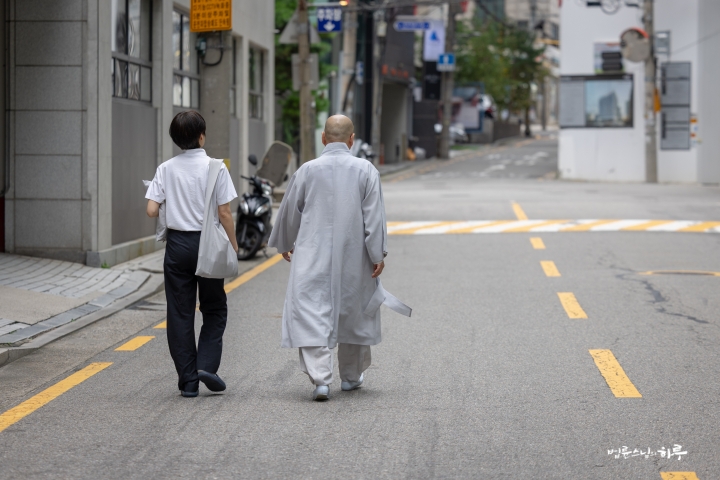
Even if a couple fights and ends up separating, they should never criticize each other in front of their children. If a child says, “Mom is the problem,” the father should respond, “Don’t say that. Your mother is a good person. The conflict arose because Dad made mistakes.” The mother should do the same. If the child says, “Dad is bad,” she should say, “You shouldn’t say that. Your father is a good person. This problem happened because Mom couldn’t properly accommodate Dad right now. It’s not Dad’s fault.” This way, even if the couple divorces, the child won’t be confused and can grow up psychologically healthy. Criticizing each other by saying “Mom is bad” or “Dad is bad” hurts the child. This makes the child’s psychology unstable. In severe cases, it can even lead to mental disorders. I believe such adults don’t deserve to be parents.
Parents should take care of their children no matter how difficult it is if the children need them. If living with someone else would be better for the child’s future, parents should step back no matter how much they miss the child. That’s what being a parent means. Fighting over a child like a pet without considering the child’s feelings is wrong. These days, children eat better and grow up in better environments than in the past, but many suffer from mental illnesses due to psychological instability. This phenomenon is expected to increase over time. It’s not that children are born with mental problems, but rather that parents’ psychological anxiety, marital conflicts, and depression affect the children. You said you want to be a good father and a good husband. Now you know what to do, right?”
“Yes, I understand well.”
“How can you become a good father?”
“I need to support the mother well so she can take good care of the child.”
“Yes. The way to become a good father is to become a good husband.” “





